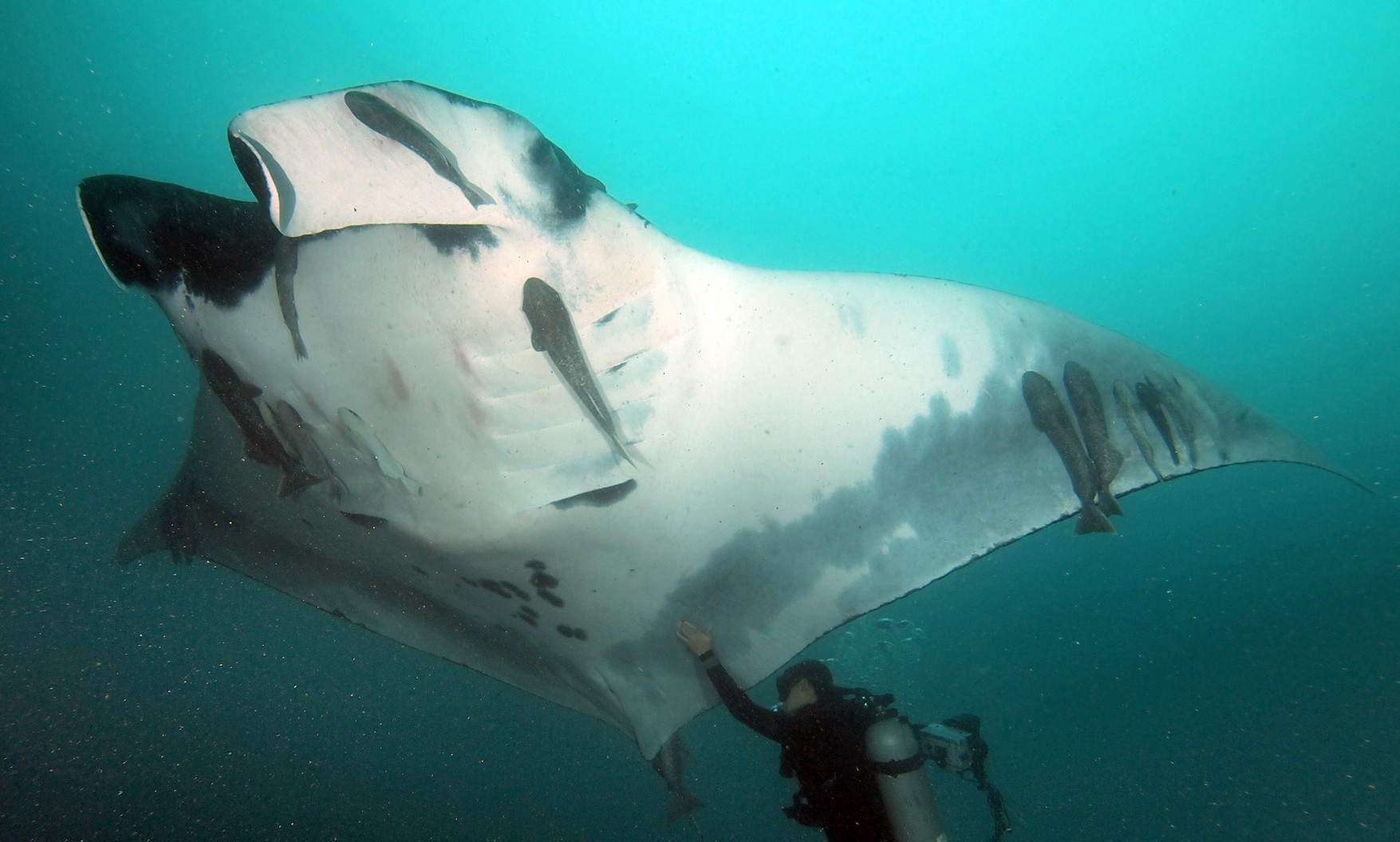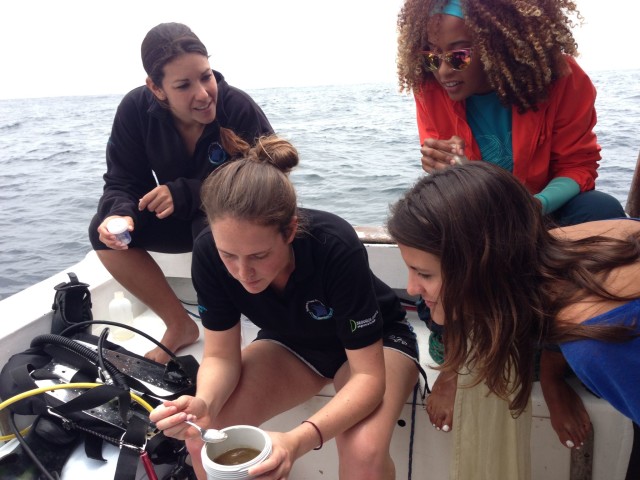Marine Life & Conservation
Amazing Women: Andrea Marshall, A Conservation Pioneer
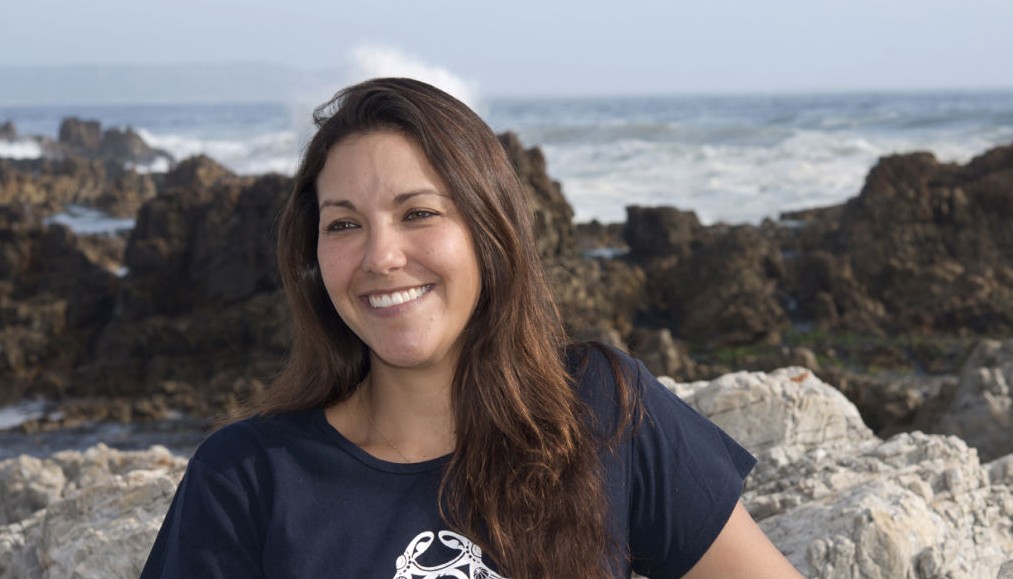
Dr. Andrea Marshall is one of the leading marine scientists and pioneers of our time. Growing up in California, she learned to dive at age 12, and like many marine enthusiasts, her first interest was in shark conservation. On a vacation to Mozambique Andrea discovered a stunning aggregation of manta rays off the eastern African coast. There had virtually been no research on these incredibly large and charismatic animals, and Andrea was fascinated by the friendly giants. She was the first person to earn a PhD by studying Manta Rays, and she has become a force to be reckoned with in her passion to study and to protect these animals. When she speaks, people listen, and they are beginning to act.
How could I begin to list her accomplishments? As I said, she was the first person to earn a PhD by studying Manta Rays. She also discovered that there were actually two species of Manta, Manta Birostris (the Giant Manta), and Manta Alfredi (the Reef Manta). In photographing and observing the mantas she began to discern identifying marks on their bellies. No two Mantas have the same spot pattern, so she kept a database with ID photos so the Mantas could be compared and recognized. Those photos can be matched with other mantas anywhere on the planet by uploading them to Manta Matcher, an automated database of ID photos of Mantas. These ID’s give researchers data on the migratory patterns and behaviors of the mantas. After a BBC documentary on her work, she became known as The Queen of Mantas. As one of the founders of Marine Megafauna Foundation and its CEO, Andrea continues to research and catalogue her data on Manta Rays all over the globe. And I do mean, all over the globe. From Africa to the Maldives to Indonesia to Ecuador and Mexico….the list goes on and on.
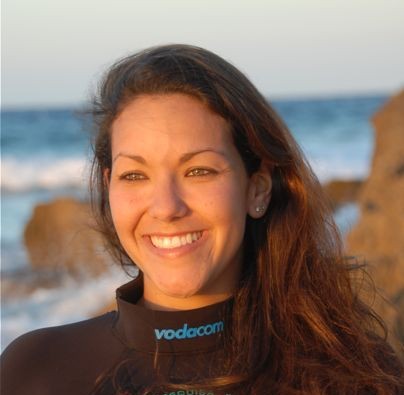 The documentary about her work in Mozambique was compelling. I had seen Mantas from a distance, and had always been fascinated by them, but when I was little we were called out of the water so the Devil Fish wouldn’t swallow us whole (of course, they wouldn’t, they are so gentle). Her research on Mantas lingered in my mind, and when I had the opportunity to do a volunteer month in Tofo, Africa (with All Out Africa) to research Whale Sharks with her co-founder Dr Simon Pierce, I jumped at the chance.
The documentary about her work in Mozambique was compelling. I had seen Mantas from a distance, and had always been fascinated by them, but when I was little we were called out of the water so the Devil Fish wouldn’t swallow us whole (of course, they wouldn’t, they are so gentle). Her research on Mantas lingered in my mind, and when I had the opportunity to do a volunteer month in Tofo, Africa (with All Out Africa) to research Whale Sharks with her co-founder Dr Simon Pierce, I jumped at the chance.
The coast along Mozambique is beautiful, and almost untouched. However, there were some harsh realities in Tofo I hadn’t prepared myself for. By the time I arrived in Tofo, 88 percent of the Mantas were gone, mostly due to unsustainable fishing practices. When heading out to dive, or coming in from a dive, our group often saw boatloads of sharks and rays being butchered right on the beach. The fins were being sold (and are being sold) to China, to end up in Chinese medicines and Shark Fin Soup (a really disgusting soup of chicken broth and fibers from shark fins.) Even though the Chinese government no longer serves Shark Fin soup at government dinners, the Chinese are still the number one consumers of endangered sharks and rays. I saw more dead sharks and rays on shore and in the square than I saw in the water. These experiences made me want to help, and I am a supporter of the Marine Megafauna Foundation in several ways. I have a Manta Ray in Mozambique I “adopted” (the funds go for research), and I named her Daenerys Targaryen, Stormborn, Queen of the Andals and the First Men, of the Rhoyne and the Seven Kingdoms, the Unburnt, and Mother of Dragons. Of course, I call her Daenerys and not by her full title (anyone who loves Game of Thrones knows what I am talking about). There are many ways to support the Marine Megafauna Foundation, so check it out!
I also went to Marine Megafauna Ecuador last year with Andrea and her team to photograph and observe Mantas. Marine Megafauna offers great expeditions so people like me can perform citizen science, and help in the conservation of marine life (or at the very least, to feel like I’m helping). Andrea and her husband, Janneman Conradie, are a friendly and unassuming couple, and working with them was easy and exciting. They are both focused on the conservation of these animals (I have written blogs about my adventures in Ecuador, you can read them here). I am scheduled to go on many more expeditions, and I wish I could go back to Ecuador this year. However, my daughter is getting married, so I’d better stick around for the wedding. It would be rather bad form to miss it!
Andrea is a National Geographic Emerging Explorer 2013, and has done an expedition with Ocean GEMS – Go Explore Marine Science for girls. What a terrific role model for our young girls! Andrea proves the point eloquently that females can do anything they want to do. Her passion has inspired many to care about the fate of not only Mantas, but of sharks and other rays as well. In the quest to stop the eradication of the species, the MMF team were instrumental in helping pass CITES Appendix II (Convention on International Trade in Endangered Species), “an unprecedented precautionary approach to avoid the over-exploitation of one of the world’s most exquisite marine animals.” In addition, Indonesia has been convinced that a manta ray is 2,000 times more valuable alive than dead. To quote Andrea’s blog, “Realizing the non-consumptive and perpetual economic value of manta rays, Indonesia has now declared that manta rays will be protected in their waters. Not only has this country committed to a ban on the fishing of mantas throughout its entire exclusive economic zone, but at the same time they make history by creating the world’s largest sanctuary for the iconic rays, encompassing 6 million square kilometers.” Following on the heels of CITES and Indonesdia, The Convention for Migratory Species CoP in Quito, Ecuador protected several species of rays and sharks in September 2014. The tide is beginning to turn, and Indonesia has recently made its first 3 arrests of manta ray part traders. The enforcement of the Indonesian ban will be instrumental in showing the world that they are serious about protecting these valuable animals.
This Amazing Woman has inspired a wave of conservation efforts in many parts of the world. Scuba Diver Life recently did a wonderful profile on Andrea and her life’s work, and there are several other profiles about Andrea and Marine Megafauna Foundation. As I am taking part in PRI and SheKnows Media’s campaign ACROSS WOMEN’S LIVES, Andrea sets a strong example of a woman living her life to the fullest.
For more information, check out Marine Megafauna Foundation, and see what you can do to help. I can tell you from experience that this group is a worthwhile investment.
Marine Life & Conservation
Leading UK-based shark conservation charity, the Shark Trust, is delighted to announce tour operator Diverse Travel as a Corporate Patron

 Corporate Patrons provide a valuable boost to the work of The Shark Trust. The Trust team works globally to safeguard the future of sharks, and their close cousins, the skates and rays, engaging with a global network of scientists, policymakers, conservation professionals, businesses and supporters to further shark conservation.
Corporate Patrons provide a valuable boost to the work of The Shark Trust. The Trust team works globally to safeguard the future of sharks, and their close cousins, the skates and rays, engaging with a global network of scientists, policymakers, conservation professionals, businesses and supporters to further shark conservation.
Specialist tour operator Diverse Travel has operated since 2014 and is committed to offering its guests high quality, sustainable scuba diving holidays worldwide. Working together with the Shark Trust will enable both organisations to widen engagement and encourage divers and snorkellers to actively get involved in shark conservation.
“Sharks are truly at the heart of every diver and at Diverse Travel, we absolutely share that passion. There is nothing like seeing a shark in the wild – it’s a moment that stays with you forever!” says Holly Bredin, Sales & Marketing Manager, Diverse Travel.
“We’re delighted to celebrate our 10th year of business by becoming a Corporate Patron of the Shark Trust. This is an exciting partnership for Diverse and our guests. We will be donating on behalf of every person who books a holiday with us to contribute towards their vital shark conservation initiatives around the world. We will also be working together with the Trust to inspire divers, snorkellers and other travellers to take an active role – at home and abroad – in citizen science projects and other activities.”
Paul Cox, CEO of The Shark Trust, said:
“It’s an exciting partnership and we’re thrilled to be working with Diverse Travel to enable more divers and travellers to get involved with sharks and shark conservation. Sharks face considerable conservation challenges but, through collaboration and collective action, we can secure a brighter future for sharks and their ocean home. This new partnership takes us one more valuable step towards that goal.”
For more information about the Shark Trust visit their website here.
For more about Diverse Travel click here.
Marine Life & Conservation
Shark Trust Asks Divers to help with Shark Sightings this Global Citizen Science Month

 Whether you are stuck for ideas of what to do with the kids or are off on the dive trip of your dreams. You can get involved in Citizen Science Month and help the Shark Trust by providing vital data about sharks are rays both close to home and further afield.
Whether you are stuck for ideas of what to do with the kids or are off on the dive trip of your dreams. You can get involved in Citizen Science Month and help the Shark Trust by providing vital data about sharks are rays both close to home and further afield.
In addition to reporting the sharks and rays you see on your dives, the eggcases you find on the beach, the Shark Trust is looking for some specific data from divers who are asked to report any Oceanic Whitetip and Basking Sharks.
Oceanic Whitetip Sharks
The Shark Trust are looking specifically for Oceanic Whitetip Shark sightings over the coming weeks and months. So, if you are diving anywhere in the world, please report your sightings via the website or app.
Website: https://recording.sharktrust.org/
App: Search The Shark Trust in your app store
The Oceanic Whitetip. Known for their incredibly long dorsal and pectoral fins, this species was once the most abundant oceanic-pelagic species of shark on the planet.
Large and stocky, they are grey or brown above, and white below and famous for their huge rounded first dorsal fin and paddle-like pectoral fins. The fins also highly prized within the shark fin trade. Whilst they are mostly solitary, Oceanic Whitetips do occasionally hunt in groups.
An inquisitive species, they were easy prey for fisheries. Combined with their low reproductive rate, they were inevitably at high risk of population depletion. And declines of up to 99% have been reported in certain sea areas. They are listed as Critically Endangered on the IUCN Redlist (2019).
Conservation efforts to discourage further declines include listing on CITES Appendix II and CMS Appendix I. They’re also the only species prohibited from take by all the Tuna RFMOs (Regional Fisheries Management Organisations). However, these measures do not mean that Oceanic Whitetips are not still caught – whether targeted or as bycatch – in some parts of the world. With populations declining at such a high rate, effective implementation of management measures is essential to ensure that the species can recover.
If you are lucky enough to get an image of an Oceanic Whitetip and you record your sighting on the Shark Trust app or website YOU CAN WIN! All images submitted with sightings, that also give consent to use in conservation messaging, will be in with a chance to win an Oceanic Whitetip T-shirt and mug. The competition will run until the end of “Shark Month” in July – so keep those sightings (and images) coming in.
Basking Sharks
Basking Shark (Cetorhinus maximus) season is upon us, and the Shark Trust is asking everyone to keep an eye out for these majestic giants over the summer months. If you see any, you can record your sighting to the Basking Shark Sightings database.
Each year, these mighty fish return to British waters to feed on plankton. You may see one, (or a few if you’re really lucky) from around April-October. They can be seen feeding at the surface of the water, where they look like they’re basking in the sun. Thus, their name!
Sighting hotspots around the British Isles include southwest England, Isle of Man, north coast of Ireland, and western Scotland. The Sea of the Hebrides is the most prolific sightings area in Scotland, but they have been spotted all around the coast and have even ventured into some of the sea lochs. The Shark Trust has received thousands of sightings since the Basking Shark project began, but more data is needed to truly understand what is going on with population numbers and distribution. You can help by recording your sightings this summer.
Great Eggcase Hunt
The Shark Trust has an Easter Egg Hunt with a difference for you to try. Take part in the Great Eggcase Hunt and get involved with a big citizen science project that helps shark, ray and skate conservation. And it’s an enjoyable activity for all the family.
The Shark Trust also want snorkellers and divers to record their underwater eggcase findings. Underwater records help pinpoint exactly where sharks and skates are laying their eggs and can help link to beach records. Learning the depth and substrate that they lay on also helps better understand the species.
Find out more: https://www.sharktrust.org/great-eggcase-hunt
Whether you are diving, snorkelling or exploring on the beach you can take part in Citizen Science Month and get actively involved in shark and ray conservation. Find out more: www.sharktrust.org
-

 News3 months ago
News3 months agoHone your underwater photography skills with Alphamarine Photography at Red Sea Diving Safari in March
-

 News2 months ago
News2 months agoCapturing Critters in Lembeh Underwater Photography Workshop 2024: Event Roundup
-

 Marine Life & Conservation Blogs2 months ago
Marine Life & Conservation Blogs2 months agoCreature Feature: Swell Sharks
-

 Blogs1 month ago
Blogs1 month agoMurex Resorts: Passport to Paradise!
-

 Gear News3 months ago
Gear News3 months agoBare X-Mission Drysuit: Ideal for Both Technical and Recreational Divers
-

 Blogs2 months ago
Blogs2 months agoDiver Discovering Whale Skeletons Beneath Ice Judged World’s Best Underwater Photograph
-

 Gear Reviews2 months ago
Gear Reviews2 months agoGear Review: Oceanic+ Dive Housing for iPhone
-
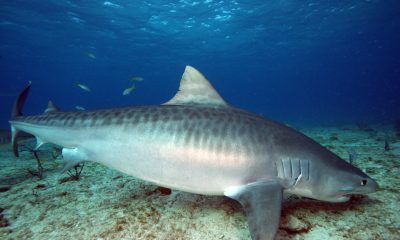
 Blogs3 months ago
Blogs3 months agoThe Thrilling Encounter with Tiger Sharks at Beqa Lagoon’s ‘The Colosseum’ with Coral Coast Divers


